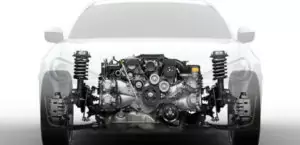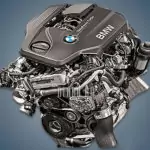Motors of the M57 series began to be installed on Munich cars since 1998 and replaced the diesel M51. The new M57D30 engine was developed on the basis of its predecessor, it also uses a cast-iron cylinder block, but the diameter of the cylinders themselves is increased. Here is an aluminum DOHC head with 24 valves. The rotation of the camshafts is given by the timing chain, which has a huge resource and under normal conditions, chain replacement may not be necessary at all.
In 2002, the production of an updated version of the M57TUD30 began, the working volume of which was tightened to a round figure of 3 liters by installing a crankshaft with a piston stroke of 90 mm. The turbine was replaced with a Garrett GT2260V, and the control unit here is DDE5. The most powerful version was called the M57TUD30 TOP and featured two different sized BorgWarner KP39 and K26 turbochargers (boost 1.85 bar), pistons with a compression ratio of 16.5, and controlled the entire DDE6 ECU.
In 2005, the M57TU2 version was released, which had a lightweight aluminum cylinder block, updated Common rail, piezo injectors, new camshafts, inlet valves of this engine were increased to 27.4 mm, a cast-iron exhaust manifold was also used, a Garrett GT2260VK turbocharger, a DDE6 ECU and all this corresponded Euro-4 standards. The TOP version was replaced with a new one – M57TU2D30 TOP, which was equipped with two BorgWarner KP39 and K26 turbines (boost pressure 1.98 bar) and a DDE7 ECU.
The M57 family also includes: M57D25.
The engine was installed on:
- BMW 3-Series E46 in 1999 – 2006; 3-Series E90 in 2005 – 2012;
- BMW 5-Series E39 in 1998 – 2004; 5-Series E60 in 2003 – 2010;
- BMW 6-Series E63 in 2007 – 2010; 6-Series E64 in 2007 – 2010;
- BMW 7-Series E38 in 1998 – 2001; 7-Series E65 in 2001 – 2008;
- BMW X3 E83 in 2003 – 2010;
- BMW X5 E53 in 2001 – 2006; X5 E70 in 2007 – 2010;
- BMW X6 E71 in 2008 – 2010;
- Land Rover Range Rover 3 (L322) in 2002 – 2006.
Specifications
| Production years | 1998-2012 |
| Displacement, cc | 2926 2993 (TU, TU2) |
| Fuel system | Common Rail |
| Power output, hp | 184 – 193 204 – 272 (TU) 231 – 286 (TU2) |
| Torque output, Nm | 390 – 410 410 – 560 (TU) 500 – 580 (TU2) |
| Cylinder block | cast iron R6 aluminum R6 (TU2) |
| Block head | aluminum 24v |
| Cylinder bore, mm | 84 |
| Piston stroke, mm | 88 90 (TU, TU2) |
| Compression ratio | 18.0 16.5 – 18.0 (TU) 17.0 – 18.0 (TU2) |
| Features | intercooler |
| Hydraulic lifters | yes |
| Timing drive | chain |
| Phase regulator | no |
| Turbocharging | Garrett GT2556V Garrett GT2260V (TU) BorgWarner KP39 + K26 (TOP-version TU) Garrett GT2260VK (TU2) BorgWarner KP39 + K26 (TOP-version TU2) |
| Recommended engine oil | 5W-40 |
| Engine oil capacity, liter | 6.75 7.5 (TU) 8.0 (TU2) |
| Fuel type | diesel |
| Euro standards | EURO 2/3 EURO 3 (TU) EURO 3/4 (TU2) |
| Fuel consumption, L/100 km (for BMW 530d 2002) — city — highway — combined |
9.7 5.6 7.1 |
| Engine lifespan, km | ~400 000 |
Disadvantages of the M57D30 engine
- The intake manifold flaps here can suddenly come off and fall into the cylinders;
- Another branded failure is considered to be the destruction of the crankshaft pulley by 100,000 km;
- The exhaust manifold of TU – TU2 versions often bursts, it is better to replace it with a cast iron one;
- Poor operation of the oil separator leads to fogging of the pipes leading to the turbine;
- Low-quality fuel and oil reduce the resource of fuel equipment and turbine.






